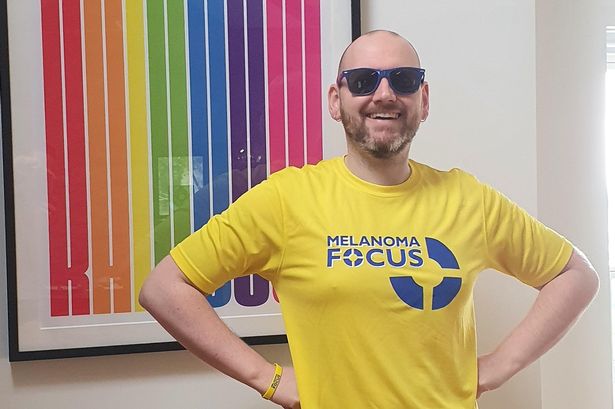[ad_1]
Luke Thomas felt he had been served a death sentence when he was told a cancerous mole had spread to his lymph nodes and across the skin.
It was stage four metastatic melanoma, an incurable form of the disease making him reliant on life-prolonging treatment.
He is currently 12 months into a targeted treatment that has a shelf life of 12 to 14 months, but despite his prognosis he plans to walk the entire Welsh coast to prove there there is life after a cancer diagnosis.
Luke, 35 from Kidwelly in Carmarthenshire plans to walk the full 870 miles carrying a back pack in a disrupted two to three month trip.
“I am excited and a bit nervous but it is a challenge and it gives me something to focus on,” said Luke, currently living in London.
He will start the walk in July, and has so far only booked one hotel as he plans to play the rest of the trip “one or two days ahead”.
While Luke will complete the entire walk alone while carrying a one-man-tent, he will be joined by some of his best friends and family along the way, as well as his consultant from St Thomas hospital in London and Rhondda MP Chris Bryant, who has previously spoke about his experience with skin cancer.
The walk will put immense challenge on Luke’s body, who said one of the side effects of his current treatment is fatigue, nauseous and joint pain.
(Image: Luke Thomas)
But he also hopes it will help keep him fit and build up his immune system as a result, along with all the walks he will be doing in preparation.
So far, the furthest he has walked in preparation is a 40km (24 miles).
“My joints were alright, but I did realise I need better shoes,” he joked.
He has even had people offer him free accommodation to stay the night along his route, as he is completely self funding the trip but has raised more than £20,000 for charity Melanoma Focus. He hopes to raise £25,000 and is sure he will blast his target before he even starts the walk in July. You can make a donation here.
“I have been reading some books that sort of thing to prepare, learning about each stretch between stops which can determine where you stay. I am kind of going into it blindly.
“I call it a glorified pub crawl,” he joked.
Despite being totally up for the challenge, Luke acknowledges his hopes of doing it in one go may not be possible and he may need to return to London for a check-up at some point, but health permitting, he is totally prepared for it.
Luke was first diagnosed with melanoma skin cancer in 2014 when an unusual mole on his back started to turn black.
The first mole Luke spotted was removed in 2014
(Image: Luke Thomas)
After surgery to remove the mole, it wasn’t until five years later, in 2019, when Luke who was working in architecture in London found another unusual mole, this time on his arm.
The mole was again confirmed to be cancerous but was localised and once again surgically removed.
But something wasn’t quite right and he started to feel weak and nauseous, then he noticed small swellings in his arm and decided to go back to the hospital to get it checked out.
“I was really ignorant about skin cancer, I thought well it’s just skin, it can just be cut out. I didn’t think it was anything major,” said Luke.
“As soon as I walked into the consultant’s room for results, I saw the nurse holding a pack of leaflets and my gut sunk, I knew.”
“It felt like a death sentence,” added Luke.
“I was in complete shock, the outlook wasn’t good, it was a bad diagnosis.”
He started immunotherapy – a type of cancer treatment that helps the immune system recognise and attack cancer cells.
The tumours spread across Luke’s skin
(Image: Luke Thomas)
But Luke’s health deteriorated, he lost weight and at one point said that he was in so much pain that he couldn’t lift his arms to go into a PET scan. He then started on targeted treatment which he continues to have now.
A year on since starting targeting treatment, Luke is now classed as NED, no evidence of disease. Because the cancer is incurable, Luke will never be in remission, but for now, his health is in a good place.
“People don’t understand how deadly it can be, they think it is something that can be cut off, and while if its caught early enough, it can be, but it can spread,” he explained.
[ad_2]
Source link



